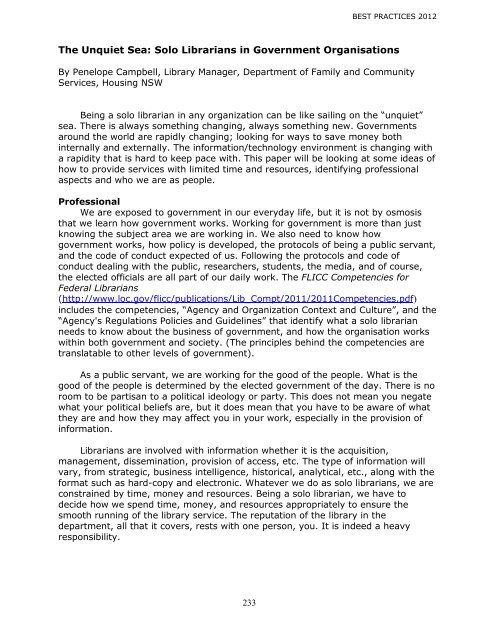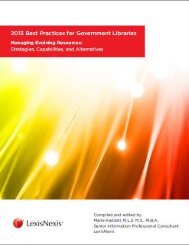2012 Best Practices for Government Libraries
2012 Best Practices for Government Libraries
2012 Best Practices for Government Libraries
Create successful ePaper yourself
Turn your PDF publications into a flip-book with our unique Google optimized e-Paper software.
233<br />
BEST PRACTICES <strong>2012</strong><br />
The Unquiet Sea: Solo Librarians in <strong>Government</strong> Organisations<br />
By Penelope Campbell, Library Manager, Department of Family and Community<br />
Services, Housing NSW<br />
Being a solo librarian in any organization can be like sailing on the “unquiet”<br />
sea. There is always something changing, always something new. <strong>Government</strong>s<br />
around the world are rapidly changing; looking <strong>for</strong> ways to save money both<br />
internally and externally. The in<strong>for</strong>mation/technology environment is changing with<br />
a rapidity that is hard to keep pace with. This paper will be looking at some ideas of<br />
how to provide services with limited time and resources, identifying professional<br />
aspects and who we are as people.<br />
Professional<br />
We are exposed to government in our everyday life, but it is not by osmosis<br />
that we learn how government works. Working <strong>for</strong> government is more than just<br />
knowing the subject area we are working in. We also need to know how<br />
government works, how policy is developed, the protocols of being a public servant,<br />
and the code of conduct expected of us. Following the protocols and code of<br />
conduct dealing with the public, researchers, students, the media, and of course,<br />
the elected officials are all part of our daily work. The FLICC Competencies <strong>for</strong><br />
Federal Librarians<br />
(http://www.loc.gov/flicc/publications/Lib_Compt/2011/2011Competencies.pdf)<br />
includes the competencies, “Agency and Organization Context and Culture”, and the<br />
“Agency's Regulations Policies and Guidelines” that identify what a solo librarian<br />
needs to know about the business of government, and how the organisation works<br />
within both government and society. (The principles behind the competencies are<br />
translatable to other levels of government).<br />
As a public servant, we are working <strong>for</strong> the good of the people. What is the<br />
good of the people is determined by the elected government of the day. There is no<br />
room to be partisan to a political ideology or party. This does not mean you negate<br />
what your political beliefs are, but it does mean that you have to be aware of what<br />
they are and how they may affect you in your work, especially in the provision of<br />
in<strong>for</strong>mation.<br />
Librarians are involved with in<strong>for</strong>mation whether it is the acquisition,<br />
management, dissemination, provision of access, etc. The type of in<strong>for</strong>mation will<br />
vary, from strategic, business intelligence, historical, analytical, etc., along with the<br />
<strong>for</strong>mat such as hard-copy and electronic. Whatever we do as solo librarians, we are<br />
constrained by time, money and resources. Being a solo librarian, we have to<br />
decide how we spend time, money, and resources appropriately to ensure the<br />
smooth running of the library service. The reputation of the library in the<br />
department, all that it covers, rests with one person, you. It is indeed a heavy<br />
responsibility.



